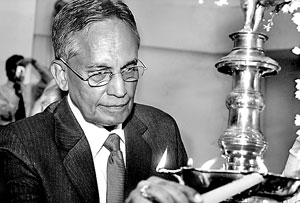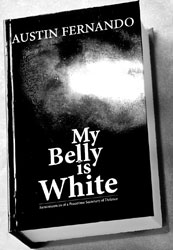My Belly is White, by Austin Fernando.
Reviewed by Dr Tara de Mel
Austin Fernando’s magnum opus, an almost encyclopaedic 927 pages, gives a detailed description of an era where peace was given a chance. Indeed, it has become a much talked about book in recent times.
While carefully sequencing the Government’s approach to the process of negotiations with the LTTE, the author attempts to rationalise and justify that administration’s policy to a two decade old conflict. A seasoned civil servant, backed by a volume of experience he recounts how six rounds of peace talks with the LTTE were conducted in the glare of global floodlights, thus internationalising the process of peacemaking like never before.
The author goes to great length to demystify the misconceptions associated with controversial issues that were sensationalised during that period. The Millennium City episode, releasing the Voice of Tigers transmission equipment, the Manirasakulam incident and the dealings of the Sri Lanka Monitoring Mission are cases in point.
The book also brings to light previous attempts at a workable truce during 1995, with reproductions of important letters, documents and narratives of discussions. He gives us a ringside view of the inner workings of a government that had taken the bold step towards trying out peacemaking within a turbulent and confrontational political atmosphere. The mistakes made by the regime, as admitted by the author and the lessons to be learnt by any would-be-negotiators, make stimulating reading.
Austin Fernando demotes the belief that negotiations are impossible or non-pragmatic and urges the reader to view the conflict not just in political perspective but also as a humanitarian obligation. Repeatedly and with great candour he chronicles how, what is trying to be achieved through bullets now, was achieved with words. In doing so however, the author at no time gives the impression of having underestimated the enemy or naiveté in dealing with serious situations that were critical for national security. He doesn’t make pedestrian generalisations about some of the contentious diplomatic processes that were adopted. Nor does he pretend to be insightful on all areas of military significance. He doesn’t attempt to glorify his political masters whose bidding, he and his co-peacemakers accomplished. And his criticisms are trenchant, be they against the regime he served or against others who had equal or more power.
A discerning reader will observe how he features as an important member of the peacemaking team - not as a novice in such matters, but by taking a leadership role with tenacity and shrewd diplomatic skill. His deft and balanced handling of sensitive people and delicate situations during the entire process would strike a reader.
Austin Fernando’s book may not win literary awards or glowing accolades, but it should certainly occupy the shelf of every student of politics, history and conflict resolution. It should also whet the intellectual appetite of those who wish to learn of what went right or what went wrong during this phase of contemporary history. Mostly, it shows the value of the alternative approach to the conflict that was tried out. As described on pages 620-1.
‘…the reduction of the numbers killed to around 85 …during the two years there was no devastation of infrastructure…by clearing areas that were mined we created the environment for the displaced people to return to their original homes, open shops and businesses, made them commence cultivation....building places of worship…return to normalcy. Gross Domestic Product increasing from nothing to 13% plus from the North..communication and transport were normalised..new investments started pouring in…’
 |
| Austin Fernando at the launch of his book. Pix by M.A. Pushpa Kumara |
The book runs into hundreds of sentences, rich in variety and interconnectedness, and tends to be exhaustively repetitive. It is written in simple prose and approachable style and therefore targets not just the voluble English-speaking class of readers. In that, it serves the purpose.
The author educates us of an administration’s desire to use the strategy of negotiations to resolve this conflict. It creates space to conceptualise and analyse how peacemaking was made possible without being treacherous to the nation or subservient to the enemy. It is a thesis by a former Defence Secretary who tries not to be defensive in his attempt to set the record straight.
Like Oprammire, the snake in the Ghanaian folk tale who, at death bed contorts himself to expose his ‘pure’ white belly, the author attempts to ‘exonerate’ himself and his colleagues from the charges levelled against them during their quest in peace-making. After all, like the author says, as public servants they only rose to the call of duty.
With its creative title, My Belly is White seems a timely publication. Just as timely as the author’s reproduction of the quote by the all-but-forgotten American poet Josiah Gilbert Holland (1819-81):
‘God, give us Men! A time like these demands
Strong minds, great hearts, true faith and ready hands;
Men whom the lust of office does not kill;
Men whom the spoils of office cannot buy;
Men who possess opinions and a will;
Men who have honor; men who will not lie……’. | 

